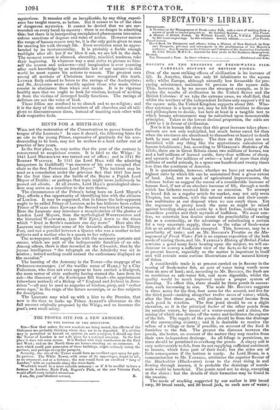HINTS FOR A BIRTH-DAY ODE.
WILL not the restoration of the Conservatives to power loosen the tongue of the Laureate ? In case it should, the following hints for an ode to the young Prince, expressive of' gratitude for his con- descending to be born, may not be useless to a bard rather out of practice of late years. In the first place, he may notice that the year of the century is consecrated to auspicious events. It is fatal to the Whigs : in 1841 Lord MELBOURNE was turned out of office ; and in 1741 Sir ROBERT WALPOLE. In 1541 (as Lord Thir., told the admiring banqueters in Guildhall) "an ancestor of his own occupied that chair as the first Protestant Lord Mayor." This incident may be used as a consolation under the grievous fact that 1841 has seen for the first time since the battle of the Boyne a Popish Lord Mayor of Dublin : or perhaps that topic might more judiciously be passed sub silentio. At all events, Lord Hikes genealogical anec- dote may serve as a transition to the next theme.
The circumstance of the Prince's being born on Lord Mayor's Day, affords a fine opportunity of identifying him with the citizens of London. It may be suggested, that in future the heir-apparent ought to be called Prince of LONDON' as he has hitherto been called Prince of WALES since EDWARD the Second was born at Carnarvon. Here the Laureate may introduce a recapitulation of the glories of London Lord Mayors, from the mythological WHITTINGTON and the historical WALWORTH, (see Wat Tyler,) down to the times which " lived in Settle's numbers one day more." Here also the Laureate may introduce some of his favourite allusions to Tilbury Fort, and run a parallel between a Queen who was a mother to her subjects and a mother who is a queen to her subjects.
The newspapers will supply him with the necessary portents and omens, which are part of the indispensable furniture of an ode. Among others, there is that recorded in the Chronicle, that.by the joyous intelligence " the telegraph on the Admiralty was set in motion ; indeed nothing could exceed the enthusiasm displayed on the occasion."
The burning of the Armoury in the Tower—the stoppage of an Ordnance-messenger, (of the warlike name of HARE,) by a City Policeman, who does not even appear to have carried a bludgeon, the mere terror of civic authority having started the hare from its cab—the discovery of the Exchequer Bill fraud—the appointment (elsewhere noticed) of a Bishop of " England and Ireland in Jeru- salem "—all may be used as auguries of wisdom, piety, and "cedunt arena togce," in the reign of the future sovereign, or as fine subjects for description. The Laureate may wind up with a hint to the Premier, that now is the time to make up Prince ALBERT'S allowance to the full amount originally proposed by the Whigs, and to increase the poet's own small salary.


























 Previous page
Previous page